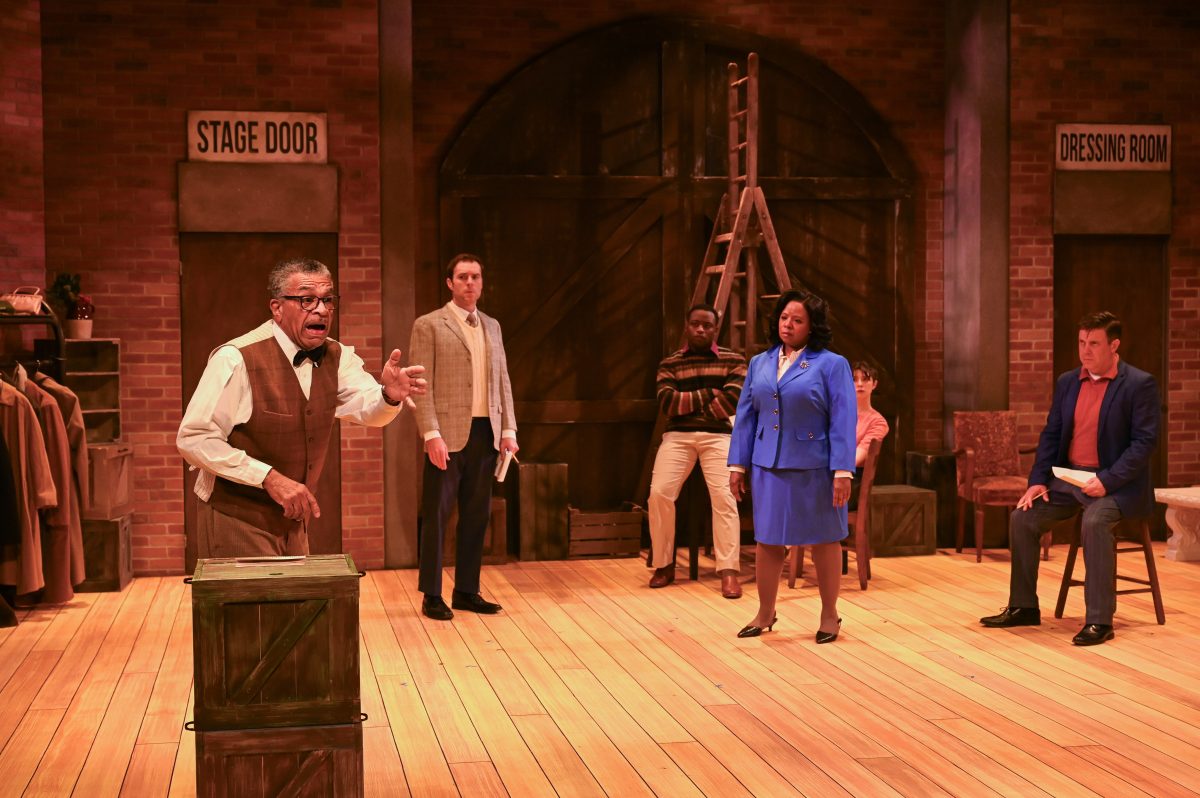On March 29, downtown Greenville’s Warehouse Theatre opened its production of “Trouble in Mind.” Written by South Carolina native Alice Childress in 1955, the play follows the cast of a new Broadway production as they navigate and confront the racism they experience as Black actors being pigeonholed into racist character roles.
The play opens with the protagonist, Wiletta (Jacqueline Springfield) warning the young and inexperienced John (Daryel T. Monson) about the harsh realities of being a Black actor. She urges him to learn the play without studying it, smile at all times and laugh at whatever jokes their white director tells. When John accuses her of being an Uncle Tom — or a Black person who is excessively servile to White people — Wiletta agrees, telling him that this is what it takes for Black actors to survive in the industry.
The play within “Trouble in Mind” includes two more Black actors, Millie (Imani-Grace King ‘19) and Sheldon (Clark Nesbitt), who also have differing approaches to handling racism. Where Millie is assertive and firm in her boundaries, Sheldon is overly compliant — and is accused of being an Uncle Tom by Millie herself.
Alongside the Black actors, the cast of the play within “Trouble in Mind” includes the young and naïve Judy (Christina Rose Yasi) and the highly prejudiced Bill (Aaron Bakersfield). These actors, in addition to crew members stagehand Eddie (Austin J. Kara) and director Al Manners (referred to as “Manners” and portrayed by David Bean), heighten the conflicts of the show as the Black actors navigate their interactions with each of them differently. Wiletta and Sheldon try to be as docile as possible, John is honest and tries to see the best in them, and Millie doesn’t shy away from expressing her feelings. These different approaches to handling racism also bring about conflict, as the white crewmembers’ masks slip, and they become more comfortable expressing their prejudiced beliefs.
Despite this authentic portrayal of the harsh realities of being a Black professional, “Trouble in Mind” was also a humorous show. With quick quips, genuine awareness and overexaggerated caricatures, each scene included plenty of comedic moments. The opening night crowd was vocal, not shying away from laughing and adding commentary. This was part of what made the show feel human – Black audience members related to the characters’ situations so deeply that they felt compelled to vocalize their understanding.
While Childress’s brilliant writing played a significant role in the connection audience members felt to the characters, the acting was also an important piece of the puzzle. All the actors perfectly molded into their characters – through the conviction with which they spoke their lines, their physicality and their facial expressions.

The production team also played a large role in the show’s impact. The set design transported the audience to a theatre within Warehouse Theatre, and the lighting allowed for seamless transitions between the show’s work lights (or the lights theatres utilize for day-to-day operations), the show’s production lights and the mood lighting. Additionally, the costumes, designed by Furman student David Jones ‘25, were stunning and helped transform the actors fully into their roles.
“I started looking for images of inspiration of the period and then bounced ideas off (director Amanda Washington), and listened to the design team to see what other visuals they were using to illustrate the themes of the show,” Jones said.
Alongside clothing, Jones’s costuming also included accessories, such as brooches, rings and watches. “My initial designs always included brooches,” Jones said. “I pulled color palettes that I thought were strong, such as blue for Wiletta to represent the purity Manners expects from her.”
In the program, Producing Artistic Director Mike Sablone reveals in his note that “Trouble in Mind” was successful when it debuted in 1955. The play was so successful that it was in talks to transfer to Broadway, but only if Childress agreed to change the ending to make the show more digestible for White audiences. When she refused, the talks ended, and the play was never performed on Broadway in Childress’s lifetime. The irony in “Trouble in Mind’s” real story is so palpable that it would be humorous if it wasn’t infuriating.
“Trouble in Mind” is a moving story that is deeply familiar for Black audience members who can relate to the internal struggle between conforming to racist societal expectations for survival and refusing to sacrifice one’s personhood and dignity. Although “Trouble in Mind” focuses on racism in theatre, its story transcends the stage and extends to the struggles that all Black working professionals face, creating a cathartic experience for Black audience members.
Warehouse Theatre will show “Trouble in Mind” until April 14. The show is two hours long, including a 15 minute intermission. Tickets are on sale now.




























